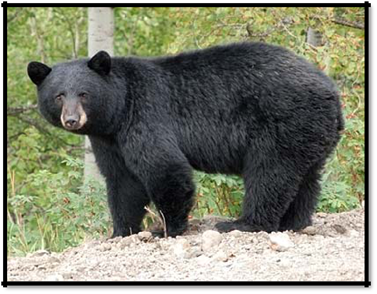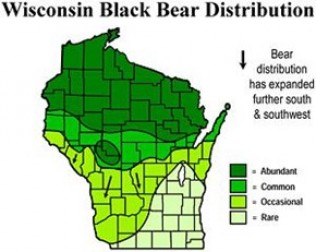Black Bear

Black Bear
Ursus americanus
-
Adult male bears average 47-70 inches long and weigh about 250-350 pounds. Female bears are smaller and weigh between 120 -180 pounds and measure 50-58 inches long.
-
They are most commonly black but can also be found in shades of brown or cinnamon.
-
About 25 percent of Wisconsin's bears have irregular white markings on their chests.
-
They can run over 30 miles per hour.
 Population: The Wisconsin black bear population is thriving and expanding its occupied range in the state. In 2010, 8,910 harvest permits were available, and hunters responded by harvesting more than 5,000 bears, the highest bear harvest documented in Wisconsin history!
Population: The Wisconsin black bear population is thriving and expanding its occupied range in the state. In 2010, 8,910 harvest permits were available, and hunters responded by harvesting more than 5,000 bears, the highest bear harvest documented in Wisconsin history!
Habits: The black bear is the most common and smallest species of bear in North America, and the only wild bear species
found in Wisconsin. Black Bears walk on the soles of their feet, the same as people, and have five toes with non-retractable claws. The bear's hind footprint looks a lot like a human one. Claws come in handy for hunting, climbing trees, and tearing open logs in search of insects.
Black bears eat all the food they need for the year in only 6 to 8 months. You might see them out at twilight between mid-May and into late September. In early fall they gorge themselves with greens, nuts, berries like black currant, carrion (dead meat), insects, and small mammals. In late fall, they stuff themselves into a cozy den and fall into deep winter sleep, but not hibernation. Here they stay for the winter months, barely breathing to keep their metabolism slow in order to survive the winter without eating.
Diet: Black bears are opportunistic eaters. They are omnivorous, eating both plants and animals. They will most often eat vegetation, berries, insects, and nuts, but will also target other animals. If they are in a farming area, livestock and crops and/or honey or bees can also become part of their diet.
Mating and Young: Black bear mothers may leave their cubs for up to 15 hours while they search for food elsewhere. If you find bear cubs without their mother, do not handle them. Leave them and call the DNR for further instructions if their mother does not return for them after 15 hours.
Information from: https://dnr.wi.gov/topic/WildlifeHabitat/documents/bearpractice.pdf and https://www.eekwi.org/animals/mammals/black-bear
To download this information: Click Here
